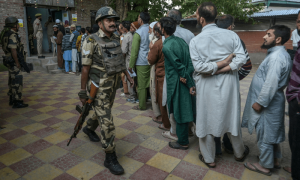PESHAWAR: The healthy department has not enforced Khyber Pakhtunkhwa Regional and District Health Authorities Act passed by provincial assembly in 2019 due to tough resistance by the employees.
The law was also amended after it drew criticism from stakeholders to make it clear. However, it cannot be enforced in the current circumstances.
The law was designed on the pattern of Medical Teaching Institutions Reforms Act 2015. The government wanted to replace the current district health system with a new one and run the district hospitals through committees, instead of district health officers under the directorate-general health services and health secretariat.
“The legislation, seeking to grant financial and administrative autonomy to local hospitals, has faced severe resistance from Provincial Doctors Association, paramedical and nursing associations due to which its enforcement has been put on hold by health department,” officials told this scribe. They added that amendments were incorporated into the law to make it acceptable to all workers of the department.
Employees opposing the Act due to fear of losing jobs
They said that the law was passed in September 2019 and its the architects allayed the concerns of employees about losing regular jobs through amendments. “However, it has been in limbo owing to strikes by the employees of health department,” they added.
The architect of MTI in Khyber Pakhtunkhwa, Prof Nausherwan Burki, who was made chairman of task force on health to prime minister three years ago, got engaged in federal matters and entrusted the health department to go ahead with the plan of setting up regional and district health authorities in two districts on pilot basis and gradually extend it to the whole province.
Officials said it was not easy to enforce the law like Medical Teaching Institutions Reforms Act, 2015, which had not been enforced to a desired level despite passing of six years. Except a few, many of the 11 MTI-covered hospitals in the province were yet to show improvement, they said.
“A hybrid system prevails as several MTIs have services of civil servants, who are being transferred out to health department and own employees are being recruited as per law,” they said. They added that before the enforcement of MTI, teaching hospitals and its affiliated colleges were managed by health department. They are now run though a Board of Governors.
“The failure of MTI is the main hurdle in the way of RHAs/DHAs as the doctors, paramedics and nurses observed strikes in 2019 when the law was passed,” said officials. They added that each time, they called off strike and returned to work after assurance of jobs’ protection by the department.
They said that the law was meant to establish 34 district health authorities to run health-related affairs in the respective districts. So far, DHOs run district health facilities and report to director general health services.
Officials said that under amended law, services of civil servants had been assured that their status would remain unchanged after enactment of law. “The ruling PTI has been persuading health department to enforce the law in consultation with the stakeholders,” they added.
The employees say that they will be transferred out of the present health facilities and posts of DHOs and directors at the provincial level would get redundant as all the financial and administrative affairs of the health services will come under the respective DHAs after enforcement of the law. “This has been happened in MTIs where civil servants were shown the door. The law has been changed but we cannot accept it at all,” they added.
Prof Burki told Dawn that he had been awaiting the department’s response regarding progress on forming authorities to improve the performance of district health facilities.
Published in Dawn, April 18th, 2022












































Dear visitor, the comments section is undergoing an overhaul and will return soon.